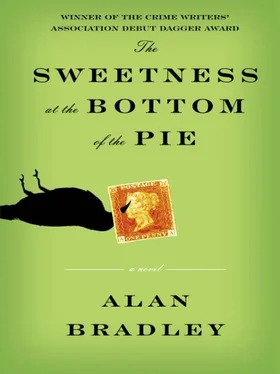Alan Bradley - The Sweetness at the Bottom of the Pie
Здесь есть возможность читать онлайн «Alan Bradley - The Sweetness at the Bottom of the Pie» весь текст электронной книги совершенно бесплатно (целиком полную версию без сокращений). В некоторых случаях можно слушать аудио, скачать через торрент в формате fb2 и присутствует краткое содержание. Жанр: Старинная литература, на английском языке. Описание произведения, (предисловие) а так же отзывы посетителей доступны на портале библиотеки ЛибКат.
- Название:The Sweetness at the Bottom of the Pie
- Автор:
- Жанр:
- Год:неизвестен
- ISBN:нет данных
- Рейтинг книги:3 / 5. Голосов: 1
-
Избранное:Добавить в избранное
- Отзывы:
-
Ваша оценка:
- 60
- 1
- 2
- 3
- 4
- 5
The Sweetness at the Bottom of the Pie: краткое содержание, описание и аннотация
Предлагаем к чтению аннотацию, описание, краткое содержание или предисловие (зависит от того, что написал сам автор книги «The Sweetness at the Bottom of the Pie»). Если вы не нашли необходимую информацию о книге — напишите в комментариях, мы постараемся отыскать её.
The Sweetness at the Bottom of the Pie — читать онлайн бесплатно полную книгу (весь текст) целиком
Ниже представлен текст книги, разбитый по страницам. Система сохранения места последней прочитанной страницы, позволяет с удобством читать онлайн бесплатно книгу «The Sweetness at the Bottom of the Pie», без необходимости каждый раз заново искать на чём Вы остановились. Поставьте закладку, и сможете в любой момент перейти на страницу, на которой закончили чтение.
Интервал:
Закладка:
"Flavia!"
"Well, you can. I'm sick and tired of being blamed for everything, Feely."
But my righteous indignation was cut short as Ophelia peered shortsightedly into the ruby flask, which was just coming to the boil.
"What's that sticky mass in the bottom?" Her long manicured fingernail tapped at the glass.
"It's an experiment. Careful, Feely, it's acid!"
Ophelia's face went white. “Those are my pearls! They belonged to Mummy!”
Ophelia was the only one of Harriet's daughters who referred to her as “Mummy”: the only one of us old enough to have any real memories of the flesh-and-blood woman who had carried us in her body, a fact of which Ophelia never tired of reminding us. Harriet had been killed in a mountaineering accident when I was just a year old, and she was not often spoken of at Buckshaw.
Was I jealous of Ophelia's memories? Did I resent them? I don't believe I did; it ran far deeper than that. In rather an odd way, I despised Ophelia's memories of our mother.
I looked up slowly from my work so that the round lenses of my spectacles would flash blank white semaphores of light at her. I knew that whenever I did this, Ophelia had the horrid impression that she was in the presence of some mad black-and-white German scientist in a film at the Gaumont.
"Beast!"
"Hag!" I retorted. But not until Ophelia had spun round on her heel—quite neatly, I thought—and stormed out the door.
Retribution was not long in coming, but then with Ophelia, it never was. Ophelia was not, as I was, a long-range planner who believed in letting the soup of revenge simmer to perfection.
Quite suddenly after dinner, with Father safely retired to his study to gloat over his collection of paper heads, Ophelia had too quietly put down the silver butter knife in which, like a budgerigar, she had been regarding her own reflection for the last quarter of an hour. Without preamble she said, “I'm not really your sister, you know… nor is Daphne. That's why we're so unlike you. I don't suppose it's ever even occurred to you that you're adopted.”
I dropped my spoon with a clatter. “That's not true. I'm the spitting image of Harriet. Everybody says so.”
"She picked you out at the Home for Unwed Mothers because of the striking resemblance," Ophelia said, making a distasteful face.
"How could there be a resemblance when she was an adult and I was a baby?" I was nothing if not quick on the uptake.
"Because you reminded her of her own baby pictures. Good Lord, she even dragged them along and held them up beside you for comparison."
I appealed to Daphne, whose nose was firmly stuck in a leather-bound copy of The Castle of Otranto . “That's not true, is it, Daffy?”
"'Fraid so," Daphne said, idly turning an onionskin page. "Father always said it would come as a bit of a shock to you. He made both of us swear never to tell. Or at least until you were eleven. He made us take an oath."
"A green Gladstone bag," Ophelia said. "I saw it with my own eyes. I watched Mummy stuffing her own baby pictures into a green Gladstone bag to drag off to the home. Although I was only six at the time—almost seven—I'll never forget her white hands. her fingers on the brass clasp."
I leapt up from the table and fled the room in tears. I didn't actually think of the poison until next morning at breakfast.
As with all great schemes, it was a simple one.
BUCKSHAW HAD BEEN THE EMPHASIS of our family, the de Luces, since time out of mind. The present Georgian house had been built to replace an Elizabethan original burnt to the ground by villagers who suspected the de Luces of Orange sympathies. That we had been ardent Catholics for four hundred years, and remained so, meant nothing to the inflamed citizenry of Bishop's Lacey. “Old House,” as it was called, had gone up in flames, and the new house which had replaced it was now well into its third century.
Two later de Luce ancestors, Antony and William de Luce, who had disagreed about the Crimean War, had spoiled the lines of the original structure. Each of them had subsequently added a wing, William the east wing and Antony the west.
Each became a recluse in his own dominion, and each had forbidden the other ever to set foot across the black line which they caused to be painted dead center from the vestibule in the front, across the foyer, and straight through to the butler's WC. behind the back stairs. Their two yellow brick annexes, pustulantly Victorian, folded back like the pinioned wings of a boneyard angel which, to my eyes, gave the tall windows and shutters of Buckshaw's Georgian front the prim and surprised look of an old maid whose bun is too tight.
A later de Luce, Tarquin—or Tar, as he was called—in the wake of a sensational mental breakdown, made a shambles of what had promised to be a brilliant career in chemistry, and was sent down from Oxford in the summer of Queen Victoria's Silver Jubilee.
Tar's indulgent father, solicitous of the lad's uncertain health, had spared no expense in outfitting a laboratory on the top floor of Buckshaw's east wing: a laboratory replete with German glassware, German microscopes, a German spectroscope, brass chemical balances from Lucerne, and a complexly shaped mouth-blown German Geisler tube to which Tar could attach electrical coils to study the way in which various gases fluoresce.
On a desk by the windows was a Leitz microscope, whose brass still shone with the same warm luxury as it had the day it was brought by pony cart from the train at Buckshaw Halt. Its reflecting mirror could be angled to catch the first pale rays of the morning sun, while for cloudy days or for use after dark, it was equipped with a paraffin microscope lamp by Davidson & Co. of London.
There was even an articulated human skeleton on a wheeled stand, given to Tar when he was only twelve by the great naturalist Frank Buckland, whose father had eaten the mummified heart of King Louis XIV.
Three walls of this room were lined from floor to ceiling with glass-fronted cabinets, two of them filled row upon row with chemicals in glass apothecary jars, each labeled in the meticulous copperplate handwriting of Tar de Luce, who in the end had thwarted Fate and outlived them all. He died in 1928 at the age of sixty in the midst of his chemical kingdom, where he was found one morning by his housekeeper, one of his dead eyes still peering sightlessly through his beloved Leitz. It was rumored that he had been studying the first-order decomposition of nitrogen pentoxide. If that was true, it was the first recorded research into a reaction which was to lead eventually to the development of the A-bomb.
Uncle Tar's laboratory had been locked up and preserved in airless silence, down through the dusty years until what Father called my “strange talents” had begun to manifest themselves, and I had been able to claim it for my own.
I still shivered with joy whenever I thought of the rainy autumn day that Chemistry had fallen into my life.
I had been scaling the bookcases in the library, pretending I was a noted Alpinist, when my foot slipped and a heavy book was knocked to the floor. As I picked it up to straighten its creased pages, I saw that it was filled not just with words, but with dozens of drawings as well. In some of them, disembodied hands poured liquids into curiously made glass containers that looked as if they might have been musical instruments from another world.
The book's title was An Elementary Study of Chemistry , and within moments it had taught me that the word iodine comes from a word meaning “violet,” and that the name bromine was derived from a Greek word meaning “a stench.” These were the sorts of things I needed to know! I slipped the fat red volume under my sweater and took it upstairs, and it wasn't until later that I noticed the name H. de Luce written on the flyleaf. The book had belonged to Harriet.
Читать дальшеИнтервал:
Закладка:
Похожие книги на «The Sweetness at the Bottom of the Pie»
Представляем Вашему вниманию похожие книги на «The Sweetness at the Bottom of the Pie» списком для выбора. Мы отобрали схожую по названию и смыслу литературу в надежде предоставить читателям больше вариантов отыскать новые, интересные, ещё непрочитанные произведения.
Обсуждение, отзывы о книге «The Sweetness at the Bottom of the Pie» и просто собственные мнения читателей. Оставьте ваши комментарии, напишите, что Вы думаете о произведении, его смысле или главных героях. Укажите что конкретно понравилось, а что нет, и почему Вы так считаете.












